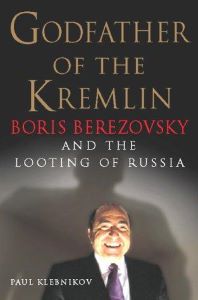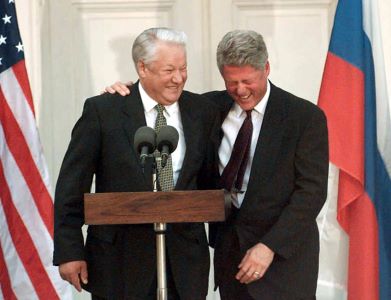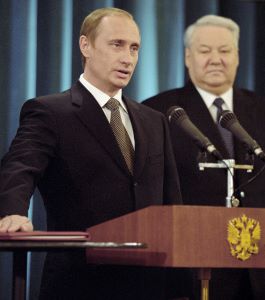Know Your Enemy
Massive amounts of money, resources, and blood circle the drain in Ukraine. It would serve well to understand the Russia of today, most importantly how Putin rose to the top. It's always fraught with problems to begin history at a specific point, but to in anyway understand present Russia, it is essential to understand Russia of the 1990s.
In America, the 1990s were the Go-Go Bubba Years – dotcom fortunes, ten dollar a barrel oil, corporate globalization, end of history, and blowjobs in the Oval Office – Oh Bubba! What mattered the happenings elsewhere in the world, especially in the collapsed Evil Empire?
For Russia, the 90s were a complete horror show. With the actions of the Yeltsin government, the Russian economy completely collapsed, creating a new political and economic gangster oligarchy. At the end of 90s, Yeltsin's handpicked successor, Putin, ascended to the top.

There's two excellent books documenting events in Russia in the 90s. The first is Second Hand Time: The Last of the Soviets (2016), by Svetlana Alexievich. This is an oral history of average Russians concerning the end of the Soviet Union, then the complete collapse of the new Russian economy and politics under Yeltsin. It is not easy reading, overwhelmingly wrenching and horrific, but also a beautiful chronicle of human resilience in the most desperate times.
The second book is Paul Klebnikov's, Godfather of the Kremlin: Boris Berezovsky and the Looting of Russia (2000). Klebnikov was an American of White Russian descent and an editor at Forbes’ magazine. Four years after this book was released, he was gunned down (still unsolved) on the streets of Moscow. While Second Hand Time is the stories of the average Russian, Godfather of the Kremlin chronicles the creation of the Russian oligarchy with the complete culpability and total corruption of the Yeltsin regime.

Without going into the details of Klebnikov book, the role in this mess of America’s DC establishment deserves attention, specifically, the direct role of the Clinton administration in the 1996 Russian presidential election.
As the 1996 election approached, Yeltsin was immensely unpopular. In 1993, he had shelled and dismissed the Russian Parliament, creating a new constitution giving him Czar-like powers. In his first term, he had unleashed a series of reforms that completely collapsed the economy, creating an economic system largely ruled by a gangster oligarchy.
The new oligarchy was completely dependent on Yeltsin's incompetence and complicity. They organized Yeltsin's reelection campaign. It was illegally funded through the government, which sent hundreds of millions to the oligarchs' companies, part of which was funneled back into the Yeltsin campaign. However, this wasn’t enough. Yeltsin appealed to the Clinton administration for help.
The Clintons were total apologists for Yeltsin and the emerging oligarchy. By 1996, the oligarchy's control was obvious to all, Klebnikov writes,
“FBI director Louis Freeh was asked in those same hearings whether a "permanent criminal culture" was emerging in Russia, he replied: "The jury is probably still out on that. I think they are at an obviously critical time ... as to who is really in charge — the criminals or the democratically elected officials.” Freeh was speaking diplomatically. Organized crime in Russia was not some kind of shadow government — it lay at the core of the Yeltsin regime.
Yeltsin’s appeals were met with a $10 billion IMF loan and a pre-election Russian visit by Mr. Bill praising Yeltsin's democratic values. Yeltsin is reelected with what Klebnikov documents as one of the most corrupt, farcical election campaigns of history. He ends the chapter on the 1996 election with the wonderfully ironic, “Western observers concluded that the election was generally free and fair.”
Klebnikov concludes,
The U.S. government's repeated praise of the Yeltsin regime as "democratic" and "reformist" damaged the liberal principles on which Western societies are based. The issue came to a head during the 1996 Russian presidential elections, when the Clinton Administration was faced with a choice of supporting either Yeltsin or the Communist candidate, Gennady Zyuganov, who was said to represent a return to the Cold War past. There was no reason for the United States to favor either one. When one is faced with a choice between two evils and not compelled to choose either one, the correct course of action is to abstain. But the Clinton Administration abandoned the stated U.S. policy of staying aloof from other countries' political processes and threw its weight behind Yeltsin, promoting his campaign with both rhetoric and money.

In a paragraph, Klebnikov succinctly sums up DC's unaccountable and deliberate culture of delusion,
“In 1998, a top Russia analyst at the CIA told The New York Times that the Clinton Administration routinely discouraged reports about the corruption of the Yeltsin regime. One such report about Prime Minister Chernomyrdin (said by the CIA to have amassed a personal fortune of $5 billion by 1996) was returned by Vice President AI Gore with a "barnyard epithet" scribbled across it. This self delusion on the part of the Clinton Administration was confirmed in a 1999 article by Fritz Ermarth, a veteran CIA Russia hand and former chairman of the National Intelligence Council. Ermarth spoke of American policy makers' "disdain for analysis about the corruption of Russian politics and their Russian partners." Ermarth attributes this primarily to the "warping of intelligence analysis to fit political agendas" and to "a cynical Washington habit of ... preserving the image of a foreign policy success.”
“Washington's habit of preserving the image of foreign policy success,” in this case saw the second, drunken, incompetent Yeltsin administration cementing oligarchical rule. At the end of his second term Yeltsin resigns the presidency several months early in order to directly hand power to Putin. Klebnikov ends his book,
“The same evening that Yeltsin made his resignation speech, Vladimir Putin, the new acting president of Russia, signed a decree granting Boris Yeltsin and his family an array of benefits and privileges, including immunity from criminal prosecution.”

President Clinton's official statement on Yeltsin's resignation praises,
“His lasting achievement... building new political institutions under democratically elected leaders within a constitutional framework.
Adding of Putin and the complete rigging of the election succession process,
“I look forward to working with Acting President Putin as the Russian people begin the process of making the transition from one democratically elected President to another.”
Today, Americans are told tens of billions of dollars sent to the Ukraine, spilling endless blood and causing untold suffering, are in support of democracy and in opposition to a Russian regime DC officialdom was not simply complicit but culpable in bringing to power.
How will this delusion conclude?

